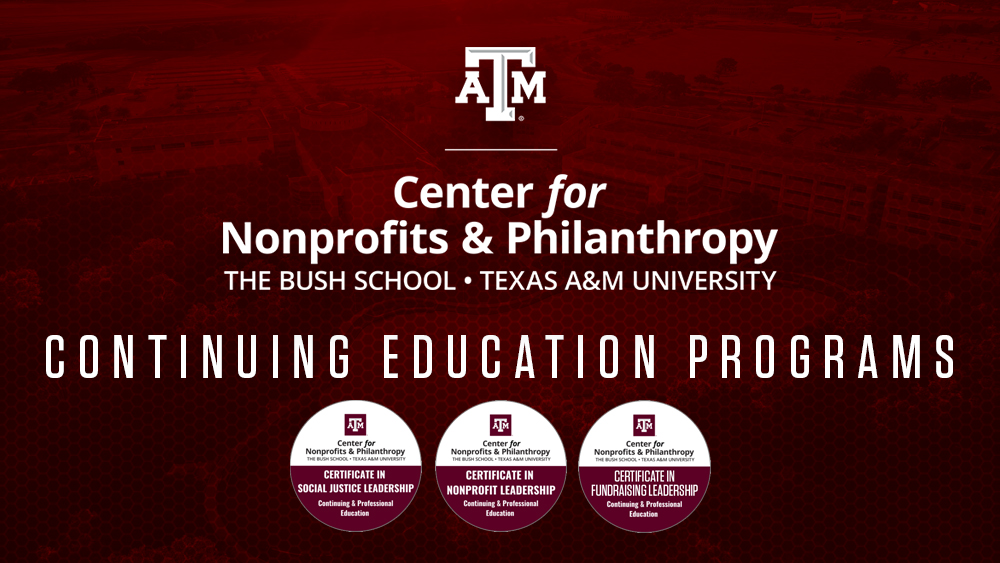
The Center for Nonprofits and Philanthropy (CNP) at the Bush School of Government and Public Service has developed a series of continuing education programs that improve the School’s national profile and address a need in the nonprofit management space.
According to Dr. Kenneth Taylor, Director of Outreach and Professional Development at CNP, the certificate programs afford the Center the capacity to take on new instructors and broaden its educational offerings. If each program had a full cohort of 90 people per academic year, a goal Taylor said is well within CNP’s capability, the certificates could generate enough revenue to grow the program.
Expanding education opportunities for nonprofit professionals
As challenges, technologies, and best practices continue to evolve, Taylor said, “the one thing nonprofit practitioners need is continued growth and learning.” Professional certifications can provide valuable knowledge, skills, and credentialing for individuals operating in the nonprofit space. CNP harnessed the need for continuing education in nonprofit management by creating a series of online certificate programs.
Designed to address specific areas of growth in nonprofit leadership for early and mid-career professionals, the certificate programs also ensure CNP’s long-term organizational sustainability. Each certificate utilizes knowledge and expertise that already exists at the Bush School. “We weren’t trying to be something that we weren’t,” said Taylor.
The structure of the certificate program ensures quality while guaranteeing customers a high return on their investment. Both instructors and course offerings undergo rigorous quality checks before the course is launched.
The Center for Nonprofits and Philanthropy introduced the Certificate in Nonprofit Leadership (CNL) in the academic year 2020, and following that a Certificate in Social Justice Leadership (CSJL) in 2021.
“The sector has been homogenous for thirty years. Are nonprofit organizations truly doing the best job they can and delivering on their mission if they are so culturally or racially uniform in director or management roles?”
Dr. Kenneth Taylor, Director of Outreach and Professional Development at the Center for Nonprofits & Philanthropy
Each certificate consists of five courses offered sequentially and in an asynchronous, online format. In the third and final week of each course, instructors guide students through producing an application-based deliverable relevant to current issues in nonprofit leadership. For example, students in the Certificate in Nonprofit Leadership (CNL) last year created a crisis management shell that they could utilize in their organization’s response to COVID-19.
Taylor said feedback from students has been very consistent: projects are “just what they needed” to make meaningful improvements to their organization. “They share these customized tools with their board or staff.”
Addressing social justice in nonprofit leadership
The Certificate in Social Justice Leadership attracted practitioners from diverse backgrounds and geographical locations, as well as one current undergraduate student who hopes to make a career in the nonprofit sector.
“We started out with a bang,” said Taylor. While CNL’s first run had seven students, fifteen participated in the first CSJL cohort.
“That’s about where we want to be in terms of size.”
The CSJL core course introduces students to the issues and explores strategies for diversifying nonprofit leadership in terms of not only race, but other areas where nonprofits trend toward homogeneity. Subsequent courses address cultural competence and the parallels between leadership theory and Diversity, Equity and Inclusion (DEI) theory.
According to Taylor, research has identified a lack of attention given in nonprofit organizations to internal inconsistencies regarding social justice. Taylor, who is black, said that when began working in the nonprofit space in the early 1990’s, few people of color served on the boards or in management positions of the organizations he served in.
“The sector has been homogenous for thirty years,” he said. “Are nonprofit organizations truly doing the best job they can and delivering on their mission if they are so culturally or racially uniform in director or management roles?”
Learn more about the degree & certificate programs with the Center for Nonprofits & Philanthropy
With students spanning the country from Washington, D.C. to Seattle, WA, and representing various management levels, Taylor said discussion board conversations and weekly live sessions provide opportunities for students to share their diverse perspectives and experiences with other students, providing new insights on how to solve problems.
“The magic has been the way that they share amongst themselves with the discussion prompts,” he said. “As instructors, we’re serving as facilitators of the conversations we set up in the online program.” Limited cohort sizes ensure conversations have utility for each participant.
Looking to the future
CNP leadership has considered the strategic vision for the certificate venture, including addressing issues such as class size maximums and whether to require instructors to hold terminal degrees, or focus more on the individual’s prominence within the nonprofit sphere.
“We focus on maintaining high quality standards,” said Taylor. “We have to make sure we’re adding the right people” as instructors and students to ensure they are ready to actively engage with their cohorts and advocate of change within their respective organizations.
Coming in Spring 2022, the Certificate in Fundraising Leadership (CFL) enters more competitive discipline in nonprofit-oriented continuing education. Taylor says CFL stands out from similar opportunities for its relative affordability and accessibility to students of a variety of experience levels. At the same time, it upholds the rigorous education standards set forth by Texas A&M University and the Bush School.
“We have good people and will continue to attract people based on our good brand,” said Taylor.
For more information about the certificate offerings at the Center for Nonprofits and Philanthropy, visit the website.

